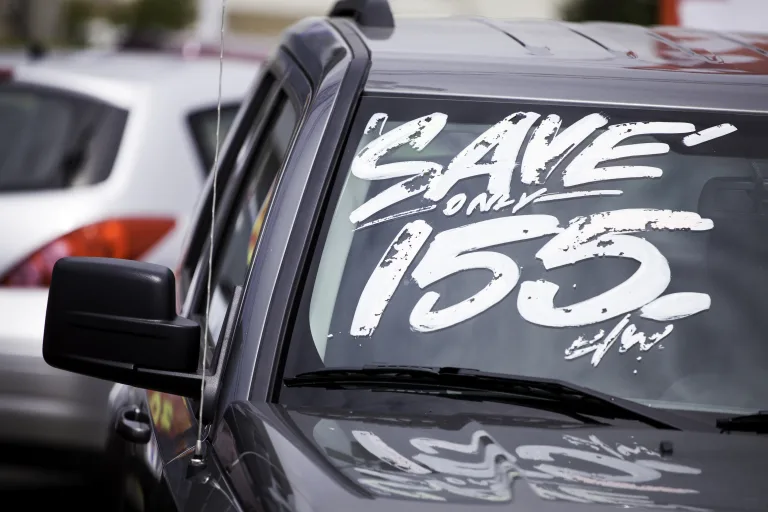Buying a used car: Be careful

Pro tip: Be careful buying a used car. The vehicle might have hidden defects or the seller might be dishonest. Learn what to watch for and how to avoid problems.
What you should know
You can buy a used vehicle from a dealer or a private seller. A dealer is anyone who sells or trades motor vehicles for a living — so not just car dealerships. Dealers must be licensed by the Vehicle Sales Authority of BC and follow certain laws.
Be on the lookout for curbers. A curber is someone who makes money selling vehicles, but isn’t a licensed dealer.
Many curbers lie about the real condition of the vehicle, hide major issues, or fail to disclose liens. A lien is somebody else’s legal claim on the vehicle — say a bank or a mechanic — because they’re owed money. If you buy a car with a lien on it, you’re taking on someone’s bad debt.
Under the law in BC, a level of quality, performance and durability is implied into every sales contract.
When you buy a car from a dealer, it has to be:
fit for the purpose you bought it for
of “merchantable” quality (it has to run)
durable for a reasonable period of time
“as described”
These conditions are the legal warranty. They apply whether the dealer mentions them or not.
If the car is faulty or it’s not as described, the legal warranty is your escape hatch. It can give you the right to get the car repaired or replaced — or cancel the contract and get your money back.
If you buy privately from an individual, the legal warranty is more limited than if you buy from a car dealer.
When you buy from a private seller, the car has to be “reasonably durable” and “as described.”
A dealer is bound by additional conditions: the car has to be of “merchantable” quality (it has to run) and “fit for the purpose” you bought it for. A private seller isn’t bound by these rules. So be careful.
Sometimes, a seller will offer a car "as-is." That sounds like it means if the car breaks down, it’s not the seller’s fault; repairs are on you.
But this isn’t true — the legal warranty still applies. Unless you waive your rights. Don’t waive these rights (either orally or in writing) unless you understand the consequences.
Dealers may ask you to put down a deposit in order to “hold” the vehicle for you before you’re ready to pay in full and take possession. If you back out of the purchase, the dealer can probably keep your deposit.
A good dealer will only ask for a deposit if they’re ordering in the vehicle for you, or if they’re adding accessories. If you do put down a deposit, get the terms in writing, and make sure to know whether it's refundable or not.
Protect yourself!
Choosing a car is already tricky (sedan or hatchback? gas or electric?). Thankfully, there are ways to prevent problems when buying a used vehicle.
Step 1. Avoid curbers
Step 2. Get an inspection
Step 3. Get a vehicle history report
Step 4. Do a lien search
Step 5. Get your agreement in writing
Step 1. Avoid curbers
Curbers operate illegally and cheat buyers. They do sneaky things like turn back the odometer so the vehicle looks like it hasn’t been driven much.
They may hide damage and lie about a vehicle’s history — including its mileage and where it came from. Or they might ask you to lie about the sale price for tax purposes.
There are many types of curbers. Some are mechanics who have repair facilities and also sell vehicles. Some curbers have several cars parked on their front lawn with “for sale” signs.
A common myth is that you can sell up to five vehicles a year privately without registering as a dealer. That’s not true. If you sell even one vehicle for profit, you must register as a motor dealer.
To learn more about what to watch for, see the Vehicle Sales Authority of BC. They offer tips on how to spot a curber.
The Vehicle Sales Authority of BC website allows you to check if a person or business is a licensed dealer. See their online licensee search. You can search by dealership or a salesperson.
Step 2. Get an inspection
Have a licensed mechanic check the vehicle to see if it’s in good shape and if it needs work. The BC Automobile Association (BCAA) can help with vehicle inspections. They offer pre-purchase inspections, safety inspections, and out-of-province-vehicle inspections. See BCAA’s vehicle inspection services.
Step 3. Get a vehicle history report
If a vehicle’s been in an accident, that can reduce its value and safety. So it’s a good thing to know. You can buy a vehicle history report from ICBC. See the ICBC website.
You'll need some basic information: the vehicle identification number (VIN), the make, model and year. Many vehicles are in the ICBC database, but not all of them.
If a vehicle was ever insured and registered outside of BC, the ICBC report won’t show that out-of-province part of the vehicle history. Consider getting a comprehensive vehicle history report from CARFAX. You can order a report from their website.
Step 4. Do a lien search
Check if there are any liens on the vehicle. A lien is a legal claim made on property to make sure a debt is repaid.
Liens are attached to a vehicle, not to its owner. If you buy a vehicle with a lien on it, the lien holder can take the vehicle as payment for the debt.
To check for liens, search the personal property registry. See the registry website.
You can also do a Canada-wide lien search with CARFAX Canada. See their website.
Step 5. Get your agreement in writing
Get a written agreement — whether you’re buying from a dealer or a private seller. Put in the terms that you want. We’ve got a handy tool to help you get started. Here's our agreement builder.
Ready to buy that used car you've had your eye on? There's still a lot to watch out for. We walk you through how the sale process works, and how to protect yourself.
This information from People’s Law School explains in a general way the law that applies in British Columbia, Canada. The information is not intended as legal advice. See our disclaimer.
Related
On Dial-A-Law
Dial-A-Law has more information on Car sales & repairs in the section on Cars & getting around.
